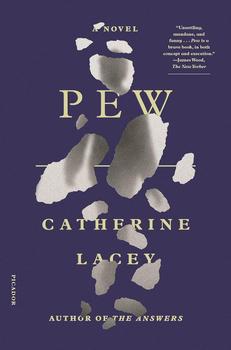Summary | Excerpt | Reviews | Beyond the book | Read-Alikes | Genres & Themes | Author Bio

A figure with no discernible identity appears in a small, religious town, throwing its inhabitants into a frenzy.
In a small unnamed town in the American South, a church congregation arrives to a service and finds a figure asleep on a pew. The person is genderless, racially ambiguous, and refuses to speak. One family takes the strange visitor in and nicknames them Pew.
As the town spends the week preparing for a mysterious Forgiveness Festival, Pew is shuttled from one household to the next. The earnest and seemingly well-meaning townspeople see conflicting identities in Pew, and many confess their fears and secrets to them in one-sided conversations. Pew listens and observes while experiencing brief flashes of past lives or clues about their origins. As days pass, the void around Pew's presence begins to unnerve the community, whose generosity erodes into menace and suspicion. Yet by the time Pew's story reaches a shattering and unsettling climax at the Forgiveness Festival, the secret of their true nature―as a devil or an angel or something else entirely―is dwarfed by even larger truths.
Pew, Catherine Lacey's third novel, is a foreboding, provocative, and amorphous fable about the world today: its contradictions, its flimsy morality, and the limits of judging others based on their appearance. With precision and restraint, one of our most beloved and boundary-pushing writers holds up a mirror to her characters' true selves, revealing something about forgiveness, perception, and the faulty tools society uses to categorize human complexity.
A quote often attributed to Leo Tolstoy states that "All great literature is one of two stories; a man goes on a journey or a stranger comes to town." In her fourth work of fiction, a spare parable with a Southern Gothic ambiance, Catherine Lacey takes the latter story line to an extreme, using her protagonist as a symbol of everything that a community fears and dismisses as foreign. Some readers may find this short novel's vagueness off-putting and its moral ambiguity disturbing. I found the book troubling but strangely compelling at the same time.....continued
Full Review
(753 words)
This review is available to non-members for a limited time. For full access,
become a member today.
(Reviewed by Rebecca Foster).
 In Catherine Lacey's novel Pew, the title character is given their name because they are found sleeping on a church pew. The word "pew" is thought to come from the Dutch "puye," meaning the enclosed front area of a building such as a town hall, where important proclamations were made. "Puye," in turn, may come from the Latin word "podium." Samuel Johnson's A Dictionary of the English Language, first published in 1755, defined a pew as "a seat enclosed in a church."
In Catherine Lacey's novel Pew, the title character is given their name because they are found sleeping on a church pew. The word "pew" is thought to come from the Dutch "puye," meaning the enclosed front area of a building such as a town hall, where important proclamations were made. "Puye," in turn, may come from the Latin word "podium." Samuel Johnson's A Dictionary of the English Language, first published in 1755, defined a pew as "a seat enclosed in a church."
Wooden pews as we know them today first became widespread in Europe in the 1500s following the Protestant Reformation. Before that, church floors were usually kept bare because the congregation stood during services. Some churches kept moveable, backless stone benches ...
This "beyond the book" feature is available to non-members for a limited time. Join today for full access.

If you liked Pew, try these:

by M.O. Walsh
Published 2021
The New York Times bestselling author of My Sunshine Away returns with another instant Southern classic: a gripping and heartfelt novel about a mysterious machine that upends a small Louisiana town, asking us all to wonder if who we truly are is who we truly could be.

by Therese Anne Fowler
Published 2021
A gripping contemporary novel that examines the American dream through the lens of two families living side by side in an idyllic neighborhood, over the course of one summer that changes their lives irrevocably, from the New York Times bestselling author of Z and A Well-Behaved Woman.